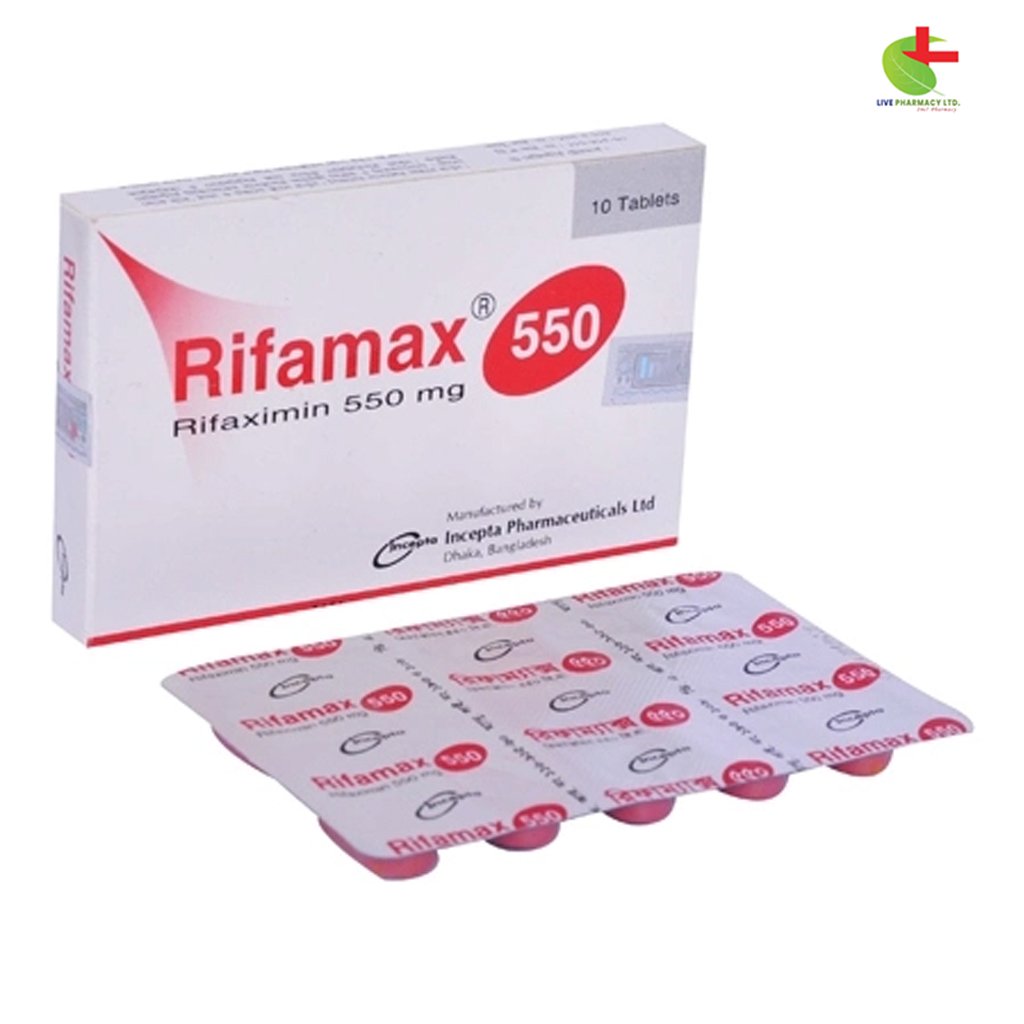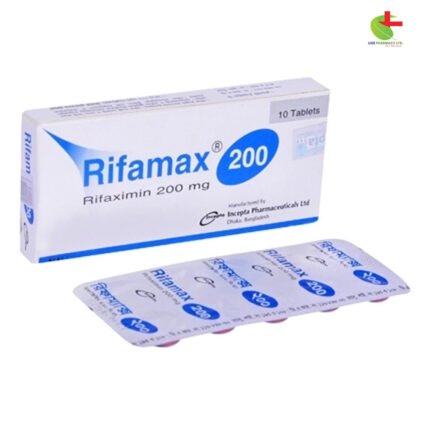Rifamax 550
450.00৳ Strip
- Rifamax is a non-systemic antibiotic containing Rifaximin.
- Used for treating traveler’s diarrhea, reducing the risk of hepatic encephalopathy, and managing bacterial overgrowth in IBS.
- Works by inhibiting bacterial RNA synthesis, targeting a broad spectrum of harmful bacteria.
- Generally well-tolerated with minimal absorption into the bloodstream, offering effective treatment with fewer systemic side effects.
- Always follow your healthcare provider’s guidance for use.
 Brand
Brand
|
Incepta Pharmaceuticals Ltd |
|---|---|
 Generics
Generics
|
Rifaximin |
 Type
Type
|
Tablet |
Indications
Rifamax is primarily prescribed for the following conditions:
- Traveler’s Diarrhea caused by non-invasive strains of Escherichia coli (E. coli)
- Prevention of overt hepatic encephalopathy
- Bacterial Overgrowth in Irritable Bowel Syndrome (IBS)
Note: Use only as directed by a registered healthcare provider.
Pharmacology
Rifamax contains Rifaximin, a semisynthetic antibiotic derived from rifamycin. It is a non-systemic drug, meaning only a minimal amount is absorbed into the bloodstream after oral administration, limiting its systemic effects. Rifaximin works by inhibiting bacterial RNA synthesis through its action on the beta-subunit of DNA-dependent RNA polymerase. It is highly effective against a broad spectrum of both Gram-positive and Gram-negative bacteria, as well as aerobic and anaerobic organisms, exhibiting bactericidal properties similar to other rifamycin-based antibiotics.
Dosage and Administration
For Traveler’s Diarrhea (in patients ≥12 years old):
- 200 mg, 3 times daily for 3 days
For Hepatic Encephalopathy (in patients ≥18 years old):
- 550 mg, 2 times daily
For Bacterial Overgrowth in Irritable Bowel Syndrome (IBS):
- 400 mg, 3 times daily for 10 days, OR
- 550 mg, 3 times daily for 14 days
Can be taken with or without food.
Always follow the dosage instructions provided by your healthcare professional.
Drug Interactions
In vitro studies suggest that Rifamax may induce CYP3A4 enzymes, but at the recommended dosage and in patients with normal liver function, this effect is not significant.
Contraindications
Rifamax should not be used in patients who are allergic to Rifaximin, other rifamycin-based antibiotics, or any of the ingredients in this product.
Possible Side Effects
Common side effects may include:
- Flatulence
- Headache
- Abdominal pain
- Rectal discomfort or urgency
- Nausea and constipation
- Fever and vomiting
Severe reactions, although rare, can occur, including:
- Anaphylaxis
- Angioedema (swelling of deeper layers of skin)
- Exfoliative dermatitis
Seek immediate medical attention if severe allergic reactions occur.
Pregnancy and Lactation
Pregnancy Category C – The safety of Rifamax during pregnancy has not been fully established. It is not known whether Rifaximin passes into breast milk. Consult your doctor before use if you are pregnant or breastfeeding.
Precautions and Warnings
- Not suitable for diarrhea with fever or blood in stools – Rifamax is not effective in such cases and should be discontinued if symptoms worsen or persist beyond 24–48 hours.
- Risk of Pseudomembranous colitis – Like other antibiotics, Rifamax may cause severe gastrointestinal conditions, including pseudomembranous colitis. Seek medical advice if you experience severe diarrhea after taking this medication.
Use in Special Populations
- Renal Impairment – The effects of Rifamax in individuals with kidney impairment have not been specifically studied.
- Hepatic Impairment – Rifamax is more extensively absorbed in individuals with liver disease. Dose adjustments may be necessary.
Overdose Management
There is no specific treatment for an overdose of Rifamax. In the event of an overdose, discontinue the medication and provide supportive care to manage symptoms.
Therapeutic Class
Rifamax belongs to the 4-Quinolone class of antibiotics.
Storage Conditions
- Store Rifamax below 30°C, away from light and moisture.
- Keep out of reach of children.
Disclaimer
Always follow the guidance of a registered healthcare provider when using this medication.













Reviews
There are no reviews yet.